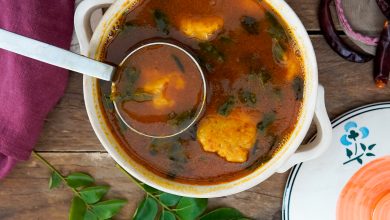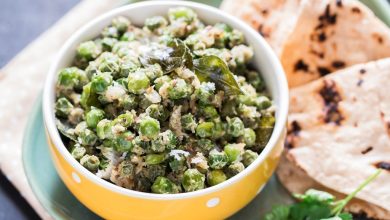Savory Pohala Jhola: Authentic Oriya Fish Curry Recipe
Pohala Jhola Recipe (Pohala Fish Curry)
Pohala Jhola, a traditional Oriya dish, offers a delightful culinary experience characterized by its robust flavors and rich textures. This delightful fish curry, made with the succulent Pohala fish, is perfect for a comforting lunch or dinner, especially when paired with steaming bowls of rice. With its straightforward preparation and the heartwarming blend of spices, this dish is bound to become a favorite in your household.
Ingredients
| Ingredient | Quantity |
|---|---|
| Pohala fish | 300 grams |
| Turmeric powder (Haldi) | 1 teaspoon |
| Tomatoes | 2 |
| Onions (red) | 2 |
| Green Chillies | 4 |
| Garlic (cloves) | 8 |
| Cumin powder (Jeera) | 1 teaspoon |
| Mustard oil | 3 tablespoons |
| Water | 3 cups |
| Salt | As required |
Nutritional Information
| Nutrient | Amount per Serving |
|---|---|
| Calories | Approx. 220 |
| Protein | High (approximately 30g) |
| Carbohydrates | Approx. 15g |
| Fats | Approx. 10g |
| Fiber | Approx. 3g |
Preparation Time
| Activity | Time (Minutes) |
|---|---|
| Preparation | 10 |
| Cooking | 40 |
| Total Time | 50 |
Servings
| Servings | 4 |
Cuisine
| Cuisine | Oriya Recipes |
Course
| Course | Lunch |
Diet
| Diet | High Protein Non-Vegetarian |
Instructions
-
Clean the Fish: Start by thoroughly cleaning the Pohala fish, ensuring it is free of any impurities. Using a sharp knife, make shallow diagonal cuts across the surface of the fish to allow the flavors to penetrate deeply. After that, sprinkle the fish with turmeric powder and salt, letting it marinate for about 5 minutes.
-
Prepare the Masala Paste: While the fish is marinating, take the garlic, onions, green chillies, and blend them into a smooth paste. Coarsely grind the tomatoes separately, as they will add a rich flavor and a tangy note to the curry.
-
Fry the Fish: In a cast iron pan, heat 3 tablespoons of mustard oil over medium heat until it shimmers. Gently add the marinated fish and fry it on both sides until it turns golden and is cooked through, which should take about 3 to 5 minutes. Once done, remove the fish from the pan and set it aside.
-
Make the Onion Masala: In the same pan, add the onion masala paste you prepared earlier and sauté for about 1 minute until it becomes fragrant. Next, add the coarsely ground tomato paste along with salt to taste, cooking for an additional 2 minutes until the mixture thickens and the oil begins to separate from the masala.
-
Create the Curry Base: Pour 3 cups of water into the pan and allow it to come to a boil for about 2 minutes. This will create a flavorful base for your curry.
-
Add Spices and Fish: Stir in 1 teaspoon of cumin powder, mixing it well into the curry base. Immediately add the fried Pohala fish back into the pan, carefully coating the fish with the curry sauce. Let it simmer for about 2 minutes on low flame, allowing the fish to absorb the flavors of the curry.
-
Serve: After simmering, turn off the heat, and your Pohala Jhola is ready to serve. Pair it with hot, steaming rice for a truly comforting and delicious meal. Enjoy the warmth and richness of this Oriya delicacy with your loved ones for a delightful dining experience!
Tips for the Perfect Pohala Jhola
- Freshness of Fish: Ensure that the fish is fresh for the best flavor. You can ask your local fishmonger for the freshest catch.
- Adjust Spice Levels: The number of green chillies can be adjusted according to your spice tolerance. For a milder curry, reduce the number of chillies or remove the seeds before using them.
- Add Vegetables: You can incorporate seasonal vegetables like spinach or drumsticks to enhance the nutritional value of the curry.
Conclusion
The Pohala Jhola Recipe captures the essence of Oriya cuisine, showcasing the delightful flavors and textures that make it unique. This curry is not just a dish but a warm embrace, perfect for any occasion. Whether it’s a family gathering or a quiet dinner at home, Pohala Jhola promises to bring joy to your dining table, complemented by the comforting taste of rice. Enjoy this culinary journey and savor the love that comes from cooking this beautiful dish.








